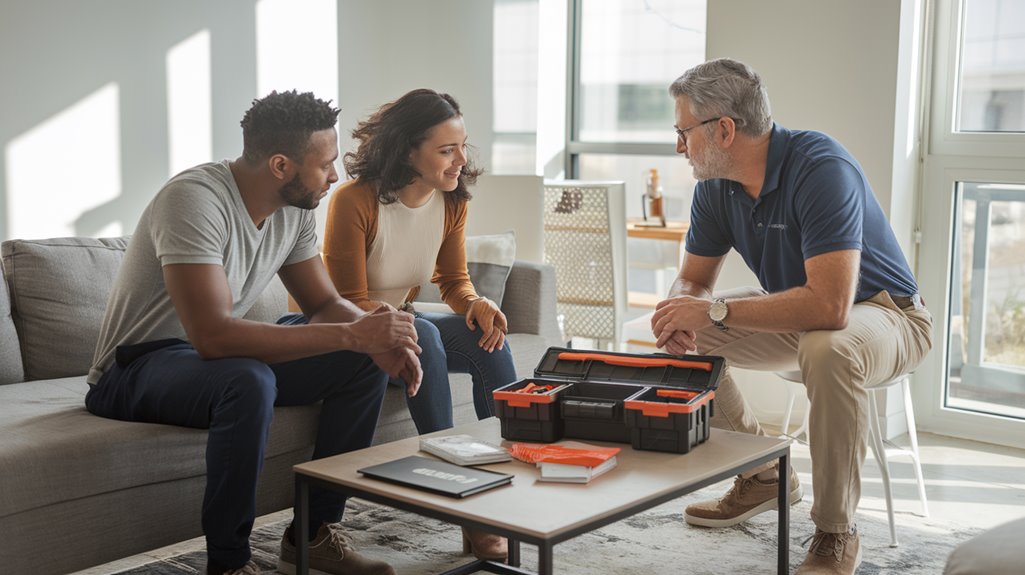When bad things happen to your home, you need to be ready. First, save money for when things break. Put aside enough cash to pay your bills for 3-6 months. Also save a bit more – about 1-3% of what your home is worth – to fix things that break.
Make a list of when to check things in your home. Write down when you need to look at the roof, heater, and other big items. Find good workers you can trust to fix your pipes, lights, and heat when they break. Keep all the papers about your home safe. Make sure you have both paper files and computer files.
Get to know the people who live near you. Join local groups so you can help each other when things go wrong. When you plan well, big problems become small ones you can fix.
Build Your Emergency Fund

Everyone's home needs fixing sometimes – just like how we need to visit the doctor. To stay safe, you need to save money for when things break.
Put away 1-3% of what your home is worth each year. Also save enough money to pay your house bills for three to six months.
The best way to save is to put money in a bank account each month. Pick an account that grows your money over time. When your water heater breaks or your roof leaks, you'll be glad you saved.
Start small. Save $1,000 for tiny fixes. Then grow it to $5,000 for bigger jobs. Try to reach $10,000 for really big fixes.
Look at your savings each month. Save more if your home is old or needs lots of work.
Document Essential Home Systems
Your home needs a care book – just like you keep track of your own health! Write down everything about your home's important parts.
Start with your heating and cooling system. What brand is it? When did you get it? How often does it need cleaning? What size filters does it use?
Next, look at your electric box. Make a simple list of what each switch controls. Is it the kitchen lights? The bedroom outlets?
Know your pipes too! Draw a map showing where to turn the water off. Write down what kind of pipes you have. Don't forget about your water heater – how old is it?
Make a list of your big machines like your fridge and washer. Keep their papers safe. Save the phone numbers of the companies who made them.
Take photos of your meters and where to turn off water and gas. Save all this info on your phone or computer so you can find it fast when you need it.
Keep papers about fixes and checkups in the same spot. When something breaks, you'll be happy you kept good notes!
Know Your Insurance Coverage

Your home needs the right insurance to keep it safe. Think of insurance like a safety net that helps when things go wrong. You need to know what your insurance will and won't pay for.
Take these simple steps:
- Talk to your insurance friend once a year to check if you need more help
- Keep your policy number and who to call in a safe spot you can find fast
- Make sure your plan covers things like water damage or storms that happen where you live
- Check that your insurance can pay to rebuild your home and buy new stuff if needed
Look at your plan's rules and costs. This way you won't have any big surprises when you need help.
Your home is special, so make sure it has the right protection.
Establish Professional Service Relationships
Get to know people who can help fix your home before you need them. Look for workers who have good reviews and all the right papers to work in your area.
Keep a list of these helpful people:
| Who to Call | When to Call | How Soon You Need Them |
|---|---|---|
| Plumber | When pipes leak or get stuck | Right away |
| Electrician | When lights go out | Right away |
| AC/Heat Person | Spring and fall check-ups | Can wait a bit |
| Roof Person | Once a year or for leaks | Can wait a bit |
| House Fixer | For big home jobs | When you plan ahead |
Put their phone numbers in your cell phone. Also write them down on paper. Talk to these workers before you have a problem. Good workers help their regular customers first when many people need help at once. Meet with them to learn about your home and what it might need.
Create a Home Maintenance Calendar
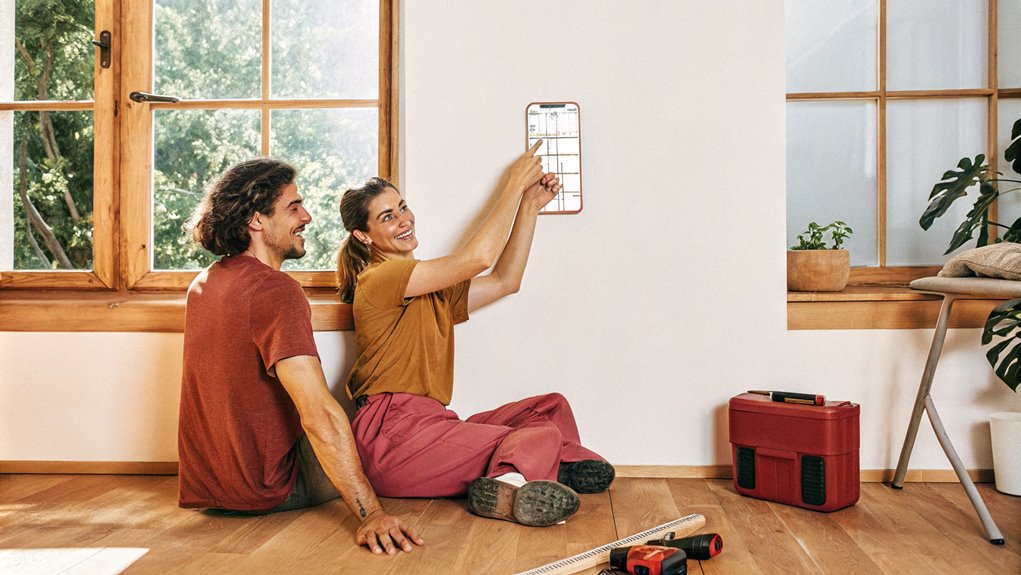
Your home needs love and care all year round. A simple calendar can help you keep track of what needs to be done.
Write down when you clean filters each month. Mark the days when someone checks your heating and cooling units.
Keep notes about fixes and updates you make to your home. This way, you can see how much money you spend on your home each year.
You can also plan better for the future and save money on home care.
Monthly Task Planning Schedule
Taking care of your home is like giving it a big hug every month.
Let's make it simple with an easy plan.
Your home needs love, just like you do. When you take care of small things now, you won't have big problems later.
Here's what to do each month:
- Change your air filters and check your heating and cooling on the first weekend
- Look at the outside of your home one week – clean gutters and check walls
- Check safety stuff in the middle of the month – make sure smoke alarms work
- Look at pipes and water heater at month's end to keep water flowing right
Put these tasks in your phone calendar.
Set alerts to remind you. This way, you won't forget to take care of your home, and it will stay happy and safe.
Seasonal Home Systems Check
Let's make your home happy and healthy all year round!
Spring is the time to check your home. Look at your air system and clean out your gutters. Make sure your roof looks good. Test the pump in your basement.
When summer comes, take care of your air conditioning. Look for holes around your windows. Check if any cracks show up in your house's base.
Fall means getting ready for cold weather. Have someone look at your heater. Clean out your chimney. Make sure all your doors and windows keep the cold air out.
In winter, wrap your pipes so they don't freeze. Watch for ice on your roof. Keep your heat working well.
Write down what you find each time you check your home. Use a notebook or your phone. This helps you remember when things need fixing and keeps your home safe.
Annual Maintenance Cost Tracking
Taking care of your home costs money. Like caring for a friend, your home needs regular love and attention. Keep track of what you spend to fix and maintain your home by writing it down. You can use a simple list or your phone to do this.
Make lists of what you spend on:
- Your monthly bills
- Things that break
- Work you do each season
Write down:
- When you fix things
- Who fixed them
- How much it cost
Look at what you spend every three months. This helps you save money for when things break.
Keep track of different parts of your home like:
- Heating and cooling
- Water pipes
- Electrical wires
When you know how much things cost, you can plan better. You'll know when to fix something or when to buy new stuff. This makes taking care of your home easier.
Stock Emergency Supplies
We all need to keep emergency supplies at home to stay safe when bad things happen. Pack enough food that won't spoil for three days. Store one gallon of water for each person in your home for each day. Keep your important medicine ready too.
Put flashlights and radios where you can find them fast. Don't forget extra batteries! Keep simple tools like wrenches and can openers ready.
Have bandages and other first aid items close by. Keep hand soap and face masks ready too. Put important papers like insurance cards in plastic bags so they stay dry. Keep your supplies in dry, sealed boxes.
Check your supplies twice a year to make sure nothing is old. Put emergency boxes in different rooms of your house. This way, you can get to them fast when the lights go out or you need to leave quickly.
Learn Basic DIY Skills
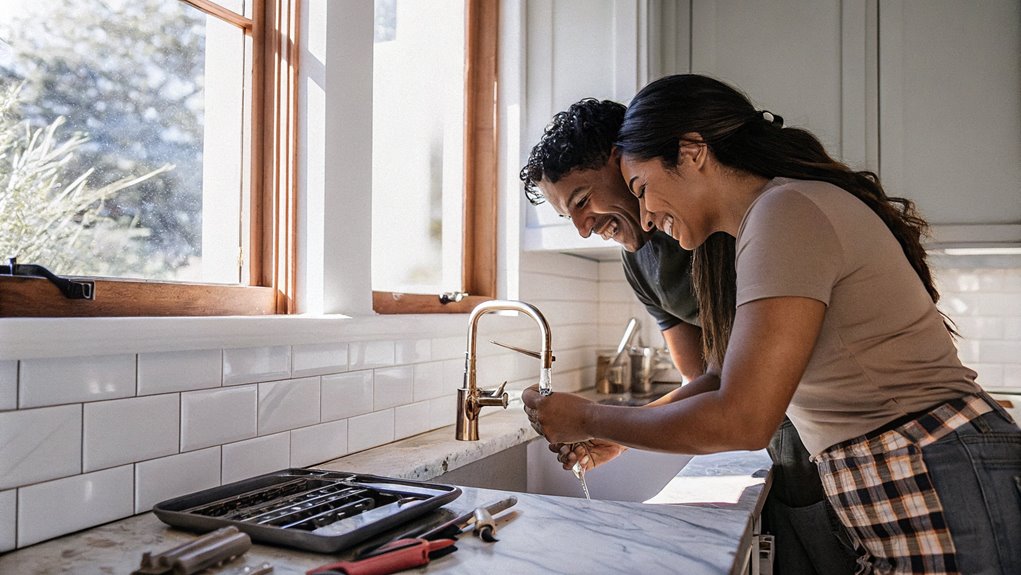
You can be your own fix-it hero at home! First, get your tools ready. You need a drill, some screwdrivers, pliers, a level, and tools to measure things. Keep them all in one box.
Next, get stuff like screws, nails, glue, wall paste, and tape. These will help you fix things around your house.
Start small – hang up some pictures or fix loose knobs. Once you feel good about that, you can fix small holes in walls. Soon, you'll be ready to fix bigger things!
Essential Tools and Materials
Having good tools helps you fix things at home. You want to be ready when something breaks or needs repair. Good tools may cost more, but they help you solve problems fast.
You need these basic tools:
- A hammer to hit nails
- Big and small screwdrivers
- A wrench that fits many sizes
- Pliers to grab and twist things
- A sharp knife for cutting
- A tape to measure things
You also need tools that plug in:
- A drill that uses batteries
- A vacuum that picks up wet and dry stuff
- A saw that cuts wood
Keep these fix-it items ready:
- Strong tape
- Oil spray
- Glue for wood
- Stuff to fill cracks
- White tape for pipes
- Lots of screws and nails
Stay safe with:
- Tough gloves
- Eye glasses that protect
- Masks for dust
- A kit for small cuts
Start With Simple Projects
Let's get you started with easy home fixes!
You have your tools ready. Now it's time to learn by doing. Try small jobs first. Fix tiny wall holes. Clear slow drains. Put on new wall plugs. These simple jobs help you feel sure about your work.
When you feel ready, try harder jobs. Fix drips in your sink. Put on new door knobs. Hang a fan from the ceiling. Take pictures of what you do. Write down the steps. This way, you can look back at how you did it.
Go to free classes at your local store. Talk to people who know how to fix things. They can teach you new tricks.
Keep your home in good shape. Clean your rain gutters. Put in fresh air filters. Check your doors and windows for gaps.
When you take care of small things now, you stop big problems later. This saves you money too.
Locate Utility Shutoff Points
You need to know where to turn off your home's power, water, and gas. This helps keep you safe when things go wrong.
Find these spots as soon as you move in. Show everyone in your home where they are.
Here's what to look for:
Water: Look for the main water switch near where water comes into your house.
Gas: Find the gas switch outside by your gas meter – you'll need a tool to turn it.
Power: Find the main power switch in your breaker box.
Oil: If you use oil heat, look for a switch by your oil tank.
Check each switch in the day. Make sure you can get to them fast.
Try them out so you know how they work.
Keep Important Documents Accessible
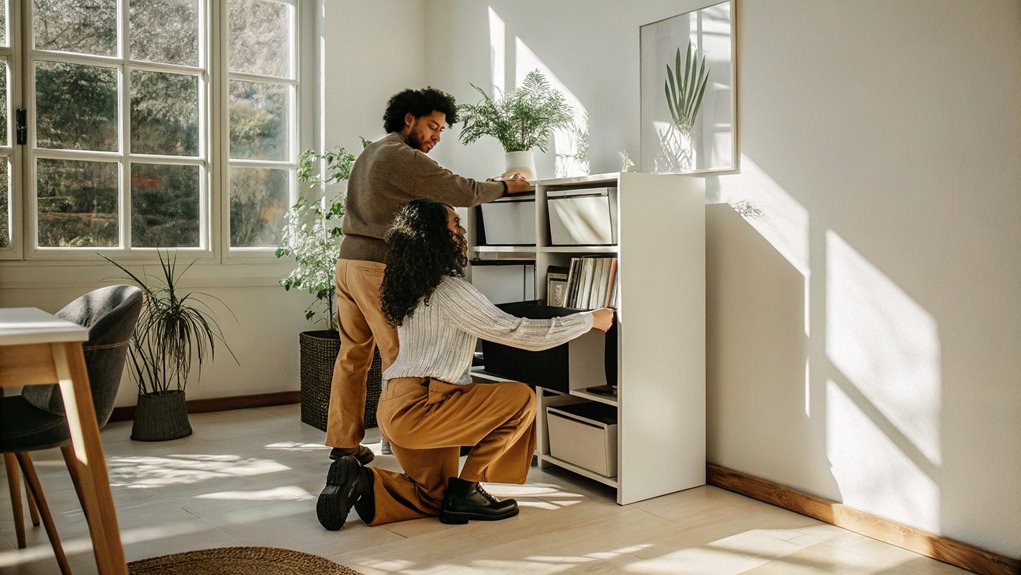
Keep your important papers where you can find them fast. Put them in a safe box or folder that's easy to reach. You need things like your house papers, bank papers, and stuff about fixing your home.
Write down phone numbers for people who can help, like repair workers and your insurance person.
Make copies of these papers and save them on your computer. Keep the real papers in a strong box that won't burn. Tell someone you trust where the box is and how to open it.
When you get new papers, put them in the box right away. Sort your papers into three piles – money stuff, house stuff, and helper numbers. This way you can find what you need fast when things go wrong.
Research Local Repair Costs
You need to know how much home fixes cost where you live. This helps you save the right amount of money for when things break.
Call local workers who fix homes. Ask them how much they charge to fix:
- Water heaters
- Air and heat units
- Roofs
- Pipes and drains
Write down all the prices they tell you. Keep track in a simple list. Costs can be very different based on where you live.
Tips to find good prices:
- Ask at least three repair people for their prices
- Talk to other home owners in your area
- Look up repair costs on the internet for your city
Save a bit more money than the prices you find. Things can cost more when you need them fixed fast.
Common repair costs:
- New water heater: $800-1,500
- Heat and air check-up: $200-600
- Roof fixes: $300-1,200
- Pipe repairs: $150-450
Join Neighborhood Support Groups

Your neighbors can help you when things go wrong at home. You can join groups online to talk with people who live near you.
There are three main ways to connect:
- NextDoor lets you talk to real neighbors right away
- Facebook Groups help you share photos and meet people
- HOA Forums tell you the rules and who can fix things
Sign up for more than one group. This helps you:
- Find good people to fix your home
- Learn what to do in emergencies
- Stay safe with neighborhood watch
- Know about common problems in your area
These groups make it easy to get help fast when you need it. Plus, you can learn from what other people near you have gone through with their homes.
| Where to Join | What You Get | Best Uses |
|---|---|---|
| NextDoor | Fast alerts, real neighbors | Help in emergencies |
| Facebook Groups | Lots of members, photos | Meet people, share tips |
| HOA Forums | Rules, approved fixers | Ask about rules |
Install Safety Equipment
Put safety tools in your home to keep your family safe.
Start with smoke alarms and carbon gas alarms on each floor. Add door alarms and cameras to watch your house.
Find all the on-off switches for water, gas, and power. Write down where they are.
Put fire tools called fire extinguishers near the kitchen and other rooms. Add water leak alarms too.
These tools can tell you if there's danger, even when you aren't home.
Fire and Smoke Detectors
Your home needs fire and smoke detectors to keep you safe. Put them all over your house to protect your family. You need one on each floor, even in the basement. Put them near bedrooms too. When one alarm goes off, they all make noise to warn you.
Get smoke detectors that can spot both slow and fast fires. Keep them away from your stove and oven. If they're too close, they might go off when you cook.
Check your alarms once a month to make sure they work. Put in new batteries every year. After ten years, buy new detectors.
Ask your city what rules they've about smoke detectors. Different places have different rules about where to put them.
Security System Basics
Your home needs good safety tools to stay safe. Think about where someone might try to break in. Then pick the right safety tools to protect those spots.
Here are the main parts you need:
| Part | What it does |
|---|---|
| Main Box | Controls everything |
| Door and Window Alarms | Tells you if someone opens them |
| Movement Sensors | Spots if someone walks around |
| Cameras | Lets you see and save videos |
Put these parts in the right spots. Put alarms on windows and doors that are easy to reach. Put movement sensors where people walk most. Put cameras outside your house. You can also get special features that let you check your home from your phone. Add phone numbers for help in case something goes wrong. Check that everything works once a month.
Emergency Shut-off Locations
When you move to your new home, you need to know where to turn things off fast in an emergency. This keeps your family safe from water, gas, and fire dangers.
First, find these shut-off spots:
- The main water shut-off: Look near where water pipes come into your house
- Power box: Check your basement or garage
- Gas shut-off: Find it next to your outdoor gas meter
- Oil switch: Near your furnace if you use oil heat
Draw a simple map to show where these spots are. Show the map to everyone who lives with you.
Put tools like wrenches and flashlights near these spots.
Every few months, check that you can still get to these shut-offs easily. Make sure they still work well.
Start a Home Repair Fund
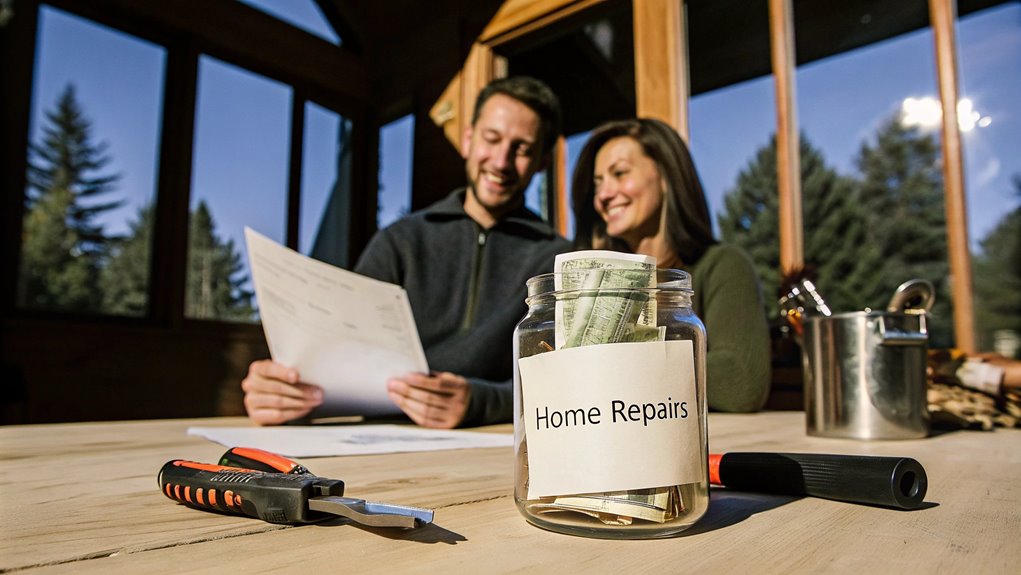
Your house needs a savings jar for repairs – just like a piggy bank for when things break. Think of it as your home's emergency money. You should save some money each month to fix things that wear out.
For every $100,000 your house costs, try to save $1,000 to $3,000 each year. Keep this money in its own bank account. Don't mix it with your other money.
Old houses need more repair money than new ones. The weather where you live also matters. If you live where it snows a lot or gets very hot, save more.
Set up your bank to move money to this account every month. This way, you won't forget. When your roof leaks or your heater stops working, you'll have money ready to fix it.
Remember: This money is only for fixing your house. Don't use it to buy other things.
Monitor Home Systems Regularly
Your home needs love and care to stay happy and healthy. Just like going to the doctor, your house needs regular check-ups too.
Look at these simple ways to keep your home in good shape:
Keep your air clean
- Look at your air filters each month
- Get a pro to check your heating and cooling twice a year
Watch for water problems
- Look at your roof when seasons change
- Clean out leaves from gutters
- Make sure rain flows away from your house
Check for leaks and sounds
- Test your water pump every few months
- Listen to your water heater for weird noises
- Look under sinks for drips
Look at your house bottom
- Check your walls for cracks
- Watch for wet spots in your basement
- See if floors are staying level
When you do these easy checks, your house stays strong.
You also save money by fixing small problems before they get big.

